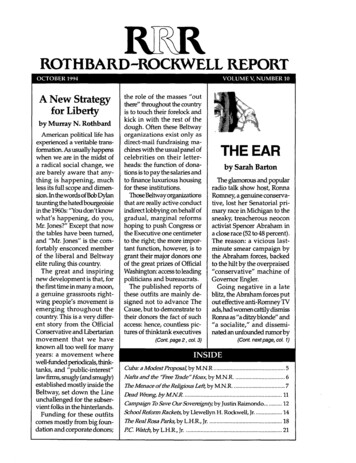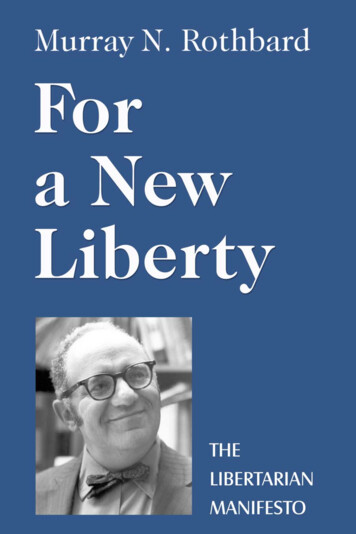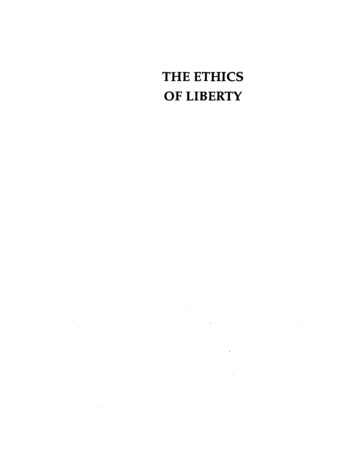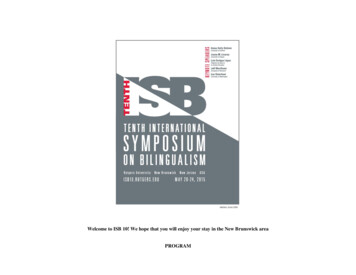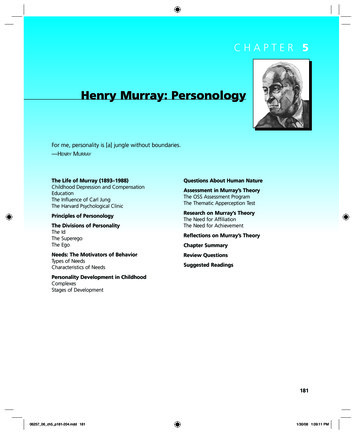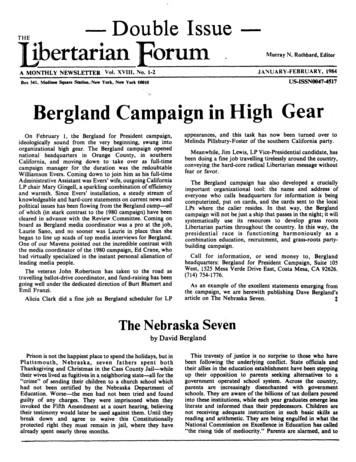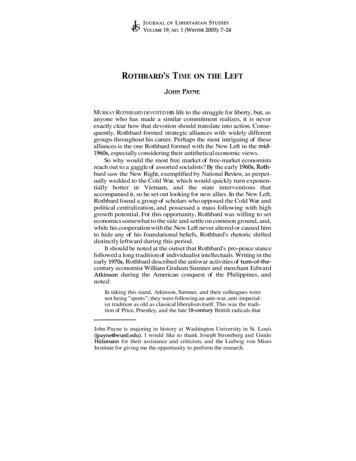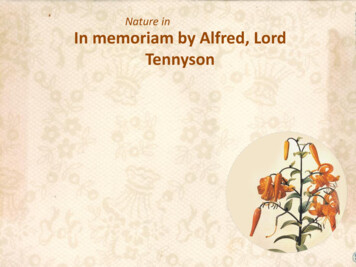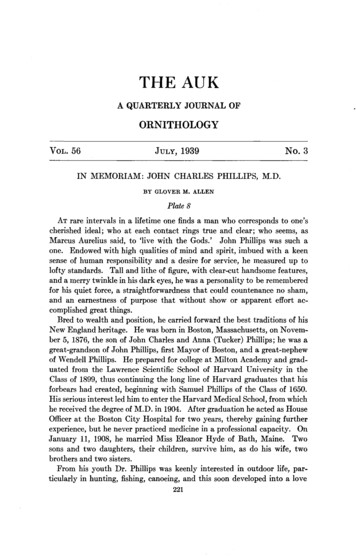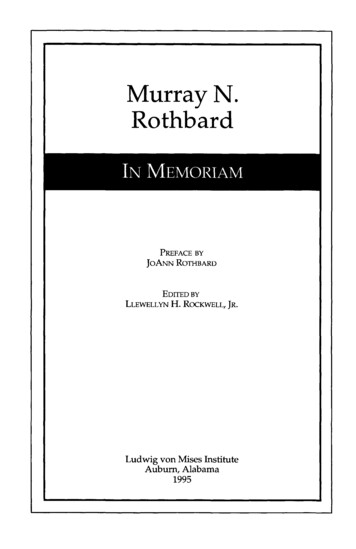
Transcription
MurrayN.Rothbard,IN MEMORIAMPREFACE BYJoANN ROTHBARDEDITED BYLLEWELLYNH. ROCKWELL, JR.Ludwig von Mises InstituteAuburn, Alabama1995
Copyright 1995 by the Ludwig von Mises Institute, Auburn, Alabama 36849-5301All rights reserved. Written permission must be secured from the publisher to useor reproduce any part of this book, except for brief quotations in critical reviews orarticles.ISBN: 0-945466-19-6
CONTENTSPREFACE, BY JOANN ROTHBARD . viiHANS F. SENNHOLZ . 1RALPH RAIco . 2RON PAUL . 5RICHARD VEDDER . . . 7ROCER W. GARRISON . 13WALTER BLOCK . 19MARTIN ANDERSON . . . 26MARK THORNTON . . 27JAMES GRANT . 29PETER G. KLEIN . 31HANS-HERMANN HOPPE . 33JOSEPH SoBRAN . 38CLYDE N. WILSON . 40PAUL GOTTFRIED . 49ALAN CARLSON . 54ROBERT HIGGS . 56DAVID GORDON . 61BURTON S. BLUMERT . 62SAMUEL FRANCIS . 64YURI MALTSEV . 67GARY NORTH . 70THOMAS J. DILORENZO . 73JOSEPH T. SALERNO . 75JEFFREY HERBENER . 85JUSTIN RAIMONDO . 89THOMAS FLEMING . 94RONALD HAMoWY . 96DAVID I. FAND . 98JOHN V. DENSON . 100LLEWELLYN H. ROCKWELL,JR . 106MURRAY N. ROTHBARD: AN OBITUARY . 122CONTRIBUTORS . 127INDEX . 129v
MURRAY NEwroN ROTHBARD1926 -1995
PREFACEMurray Rothbard had a good life.In going through the essays in this volume, one reads over andover of his enthusiasm, his optimism, his zest for life, and especiallyhis sense of humor. He was an enthusiast for many things-Austrian economics, libertarianism, politics, chess, German Baroquechurch architecture, jazz, and watching sports. He was never depressed, always optimistic, even when, as Ralph Raico writes, optimism seemed unrealistic.Murray will probably be best remembered for his writing,which as Mark Thornton wrote, was clear, certain, and consistent,with a punchy style, and always with a plumb line on his love ofliberty. Writing came easily to him. Many times, he got up at thebeginning of his day and sat down at his typewriter, still in pajamas,to write an article quickly. It would come out with his usual hardedged content. He did not mince words. Also, he did not like towrite more than once about any subject, but he had plenty of ideas,so each piece he wrote was new and fresh. As Sam Francis writes,he had an instinct for combat that came out in his writing as well ashis speeches.Murray was a lifelong libertarian. One nincompoop wrote,after his death, that if everyone had been a libertarian, Murraywould have been something else. This, of course, is nonsense andinsulting. The more liberty there was in the world, the happier hewas. As Joe Salerno writes, liberty, for Murray, was not an aridabstraction, but a necessity for life.Like many funny people, he judged other people, to someextent, by whether or not they laughed at his jokes. Real friends did.And he was lucky that in Ronald Hamowy, Ralph Raico, and BurtBlumert, among others, he had genuinely humorous friends withvii
Murray N. Rothbard: In Memoriamwhom he could share laughs. As Walter Block writes, he lived lifeto the fullest, and he was a lot of fun to live with.Murray was also very gregarious. He loved parties, and wasalways the last to leave any gathering. As Roger Garrison notes, hewas a real night owl, and became more so as he got older.Although Murray was not much interested in money, except ina theoretical sense, he managed to make a living for 40 years withouthaving to get up before noon. This was important to him.Many writers, Bob Higgs among them, have written about thedepth of Murray'S scholarship, and of his generosity in sharing it.He was a great resource on many topics---economics, Americanhistory, the history of economic thought, sports, and many others,including his favorite humorists, H. L. Mencken and S. J. Perelman.There is a story, not apocryphal I think, of a graduate student whomentioned to Murray a thesis topic he was considering. The nextday he received a 12-page single-spaced letter, with suggestions forsources to investigate.Murray was proud of his library, which numbers thousands ofvolumes. As it expanded, he found that he was able to write wholescholarly articles, using just the resources in his own home.For many years, Murray worked almost alone in spreadingAustrian economics. Gradually more students became interested inthis discipline. Unfortunately, some of them went off on a wrongpath and distorted Austrianism. When Lew Rockwell founded theLudwig von Mises Institute in 1982, there was finally a center fortrue Misesian Austrian economics. And with The Review of AustrianEconomics there was an organ for the publication of authentic Austrian articles. These were very gratifying events for Murray.However the most fun he had in his later years was writing forThe Rothbard-Rockwell Report. Imagine being a libertarian with anopinion on everything going on in the world and being able to writeand publish your ideas. What joy!Working with Lew Rockwell on the RAE and RRR made Murray's final decade immeasurably brighter. Each weekday, and oftenon weekends, Murray's day began with a conversation with Lewviii
Murray N. Rothbard: In Memoriamon the phone. Gales of laughter would shake the house or apartment, as they checked in with each other. Murray thought it was thebest possible way to start a day.Of course he died too young. Think of the books he would havewritten if he had had more time, the articles, and how he wouldhave continued to light up the lives of those who knew and lovedhim, at least one of whom now finds life "stale, flat, and unprofitable."But Murray left a wonderful legacy of writing and memories,and-as this volume shows-many friends.-ixJOANN ROTHBARD
Murray N. Rothbard: In MemoriamHANS F. SENNHOLZFoundation for Economic EducationOn January 7, 1995, Murray Rothbard departed this mortal lifeso that he may join the immortals. Sudden death deliveredhim from his daily chores and put his task in other hands.Those of us who were privileged to know Murray Rothbardhave lost a dear colleague who inspired us with his incisiveobservations, brilliant reflections, and always keen and sparklingremarks. His departure from the stage of life is a loss to the wholelibertarian world which he helped to forge and mend. He wasnot only one of the greatest economists of our generation butalso a great social and political thinker. His was a powerful mindcomparable to those of his teacher, Ludwig von Mises, and histeacher, Eugen von Bohm-Bawerk.Murray was an indefatigable worker, the author of an unending stream of books and booklets, essays and articles, many ofwhich have been translated into foreign languages. Several aremasterpieces which are destined to be studied by future generationsof students and scholars. They have earned him a place of honor inthe annals of libertarian thought.(Reprinted with permission from The Freeman).1
Murray N. Rothbard: In MemoriamRALPH RAICOState University College at BuffaloOne of the best of the many articles that Murray wrote wastitled, "H. L. Mencken: The Joyous Libertarian." It was typical of Murray, incidentally, that the piece, which he tossed off in afew hours, instantly placed him in the front rank of Menckenscholars. In this article, Murray wrote: "Any man who is an individualist and libertarian in this day and age has a difficult row tohoe. He finds himself in a world marked, if not dominated, by folly,fraud, and tyranny."What is such a person to do? "He may retire from the politicalworld into his private occupation . [or] purely aesthetic contemplation." Or "he can stay in the world, enjoying himself immenselyat this spectacle of folly."Mencken, Murray wrote, had chosen this last way. It requiredthat its practitioner be "an individualist with a serene and unquestionable self-confidence; he must be supremely 'inner-directed,'with no inner shame or quaking at going against the judgment ofthe herd. He must also have a supreme zest for enjoying life and thespectacle it affords" -he must be able to relish and lampoon asociety that has turned its back on liberty and individual excellence.Finally, he must "be deeply pessimistic about any possibility ofchanging and reforming" that society.Now, even if you didn't know Murray, it is clear from thespecial exhilaration and glee that this article exudes, that Murray inmany ways identified with Mencken. Murray was totally inner-directed, in every way his own man, guided always by values thatwere an inseparable part of him-above all, his love of liberty andof human excellence. Murray, too, had a zest in life, the capacity forenjoying the amazing spectacle, and a non-stop ability to laugh atthe absurdities. What Murray wrote of Mencken was equally trueof himself: "he sailed joyously into the fray, slashing and cuttinghappily into the buncombe and folly he sawall around him,2
Murray N. Rothbard: In Memoriampuncturing the balloons of pomposity, gaily cleansing the Augeanstables of cant, hypocrisy, and cliche."But Murray differed in a fundamental respect from the manwho was clearly a model of his own scintillating prose style: he wasnever a pessimist. In fact, he was the eternal optimist, slashing awayat the follies of the world, puncturing the balloons of pomposity,and expecting that somehow, someday, it would make a difference.Liberty and truth would win out.That's why it was always a lift to speak with Murray. There aredozens of people who will confirm what I say: it was fun being withMurray. First of all, because he was a happy man. Of course, he hadthe inestimable advantage of having met and married his perfectwife-lithe indispensable framework," as he said in the dedicationof one of his books to Joey. Occasionally, though, he took thisoptimism to extremes. Murray enjoyed election nights enormously,and I recall over the years telephone conversations, at one or two inthe morning, as Murray was still trying to figure a way we couldwin in the Electoral College-if only Oklahoma, Oregon, and Texascame in our way-meanwhile, of course, the tidal wave of popularvotes was going for the other guy.Murray was someone special. I recognized that fact the firstnight I met him. It was after the Mises seminar; a buddy of mineand I had been invited to attend, and afterwards Murray suggestedwe have coffee and talk. My friend and I were dazzled by the greatMises, and Murray, naturally, was pleased to see our enthusiasm.He assured us that Mises was at least the greatest economist of thecentury, if not the whole history of economic thought. As far aspolitics went, though, Murray said, lowering his voice conspiratorially: "Well, when it comes to politics, some of us consider Mises amember of the non-Communist Left." Yes, it was easy to see we'dmet someone very special.It took a lifetime to realize the full importance of Murray'sintellectual contributions, to particular disciplines, but more thananything else, to bringing together and synthesizing systems ofideas. There was first of all Austrian economics-the most powerfulinstrument yet devised for the understanding of social reality-of3
Murray N. Rothbard: In Memoriamwhich Murray was one of the great masters. There was the Westerntradition of natural law and natural rights, and the derivation fromthis foundation of the theory of the totally voluntary society. Andthere was the tradition of the American Old Right, the oppositionto war and foreign entanglements, and with it, revisionist history, acrucial addition, which unmasks the state in detail and empiricallyfor the murderous joke it is. Is it any wonder that Murray waslooked on as an intellectual master by so many?Murray Rothbard was the great advocate of freedom in thelatter decades of the 20th century. He will be remembered andhonored by freedom-lovers long after the hordes of the other-directed are forgotten-when William Buckley, to take one pompousballoon at random, is remembered, if at all, as the middle-brow withthe set of odd affectations, who got the meaning of "oxymoron"wrong.At the death of Murray's great teacher, Ludwig von Mises, itwas considered appropriate to quote the lines of P.B. Shelley onthe death of John Keats. I think those lines are fully as appropriatefor Murray:For such as he can lend,They borrow not from those who made the world their prey.And he is gathered to the kings of thought,Who waged contention with their time's decay,And of the past are all that cannot pass away.4
Murray N. Rothbard: In MemoriamRON PAULFormer U.S. CongressmanAmerica has lost one of her greatest men, and the FreedomMovement one of its greatest heroes: Murray N. Rothbard.In his 25 books and thousands of articles-not to speak of hispersonal example-Murray was an inspiration. With his death, allwho cherish individual rights and oppose the welfare-warfarestate, are the poorer.Murray was a world-class Austrian economist, and he influenced thousands of students. I was one of them, for he taught meabout economics and liberty, and encouraged my political workagainst war, inflation, and big government.Although I had read Murray for years, I didn't meet him until1979. I wrote him, he wrote back, and I invited him to the "belly ofthe beast," the U.S. Congress. I knew he had a great mind, butinstead of a pompous professor, I discovered a joyous libertarian,and one of the most fascinating human beings I've ever met.I loved talking to this down-to-earth genius. And he told me heenjoyed meeting a Congressman who had not only read his books,but used them as a guide in his votes and legislation. A close andlasting friendship was the result, which wasn't hard. Murray wasthe sweetest, funniest, most generous of men.He was also a great help with the Minority Report of the U.S.Gold Commission, published as The Case for Gold. But who could besurprised? He was our greatest academic expert on the history andeconomics of the gold standard.When I last talked to Murray, a few days before his untimelydeath, he urged me to run for office again. Recent elections or not,he said, our side needs an uncompromising anti-statist voice inWashington, D.C.The founder of modern libertarianism and an economist, historian, and political philosopher of extravagant accomplishments, Murray also loved-and was an expert in-Dixieland5
Murray N. Rothbard: In Memoriamjazz, the religious paintings of the Renaissance, basketball, Baroquechurch architecture, and the nitty-gritty of politics. With tremendous zest for life and for the battle, he defended our freedom andour property, and built the ideas that are their foundation.Although a Jew and not a man of faith, he loved Christianityhe was also an expert in theology and church history-and saw itas the source of almost everything good in Western civilization.Murray N. Rothbard is now for the ages. My heart goes out toJoey, his wife of 41 years, and to all of us. We have lost a matchlesschampion of freedom. But I have no concerns for Murray himself.The Lord God knows His own.6
Murray N. Rothbard: In MemoriamRICHARD VEDDEROhio UniversityOne of my regrets in life is that I did not meet Murray Rothbarduntil the middle of my academic career. One of the joys of mylife is that I got to meet him at alLMy first meeting with Murray came in 1983, when my colleagueLowell Gallaway and I were attending a Liberty Fund summerseminar conducted by the Institute for Humane Studies in Palo Alto,California. Murray was invited to a picnic of our group, and Iimmediately fell in love with his enthusiasm, his outrageous butusually correct acerbic observations about the world we live in, andhis kindness.I had always thought of Austrian economists as dour, meanspirited, and so full of ideological zeal that they could not enjoy life.Murray proved that image wrong. Sure, Murray could savagelyattack governmental misdeeds and make fun of fools, but he did itnot out of an intrinsic dislike of people and our society, but ratherout of a love for them.As recently as last summer, when Murray was in his late 60sand obviously in somewhat frail health, he remained the life of theparty, the center around which a good part of the Austrian worldgravitated.At the Mises University at Claremont McKenna College, I tookto throwing parties in my apartment to which students were invited. Murray showed up and stayed late, entertaining and enlightening professors and students alike, despite suffering from thecongestive heart failure that within months would cost him his life.The sheer force of Murray's personality was the glue that, alongwith some powerful, well-articulated ideas, cemented the relationships that constitute modem Misesian economics in America.Let me speak of three specific contributions of Murray Rothbard to the world of ideas, namely his contributions to history, laboreconomics, and academic entrepreneurship.7
Murray N. Rothbard: In MemoriamRothbard the HistorianIn an ahistorical age in which the typical 17-year-old studentdoes not know to the nearest half century when America fought itsCivil War, Murray Rothbard appreciated the lessons the past provides in understanding the way the world works. From his doctoraldissertation on the Panic of 1819, to his latest published work onearly economic thought, Murray Rothbard adroitly and audaciously used the past to challenge contemporary conventional "wisdom," usually as it related to the perceived benefits of state interventions in the private lives of individuals.My own appreciation of Murray's near encyclopedic historicalknowledge came in the course of writing two papers for The Reviewof Austrian Economics with Lowell Gallaway. For example, in thecourse of writing about "The Great Depression of 1946," we received shrewd comments from Murray about the role that the WarLabor Board played in wartime labor markets. He added to ourknowledge of the nefarious policies of Herbert Hoover, which washelpful in writing "Wages, Prices, and Employment: Von Mises andthe Progressives," our tour de horizon of labor markets in 20thcentury America for the first issue of that estimable journal.Murray was one of the very few living persons that we couldtalk to about, say, Lionel Robbins's 1934 contribution to the understanding of the Depression, the unappreciated insights of WillfordIsabel King, the timing of Lord Beveridge'S fall from grace, or theshrewdness of Benjamin Anderson's historical analysis. What isamazing, he could also discourse with equal facility about, say, theeconomics of Richard Cantillon or St. Thomas Aquinas, writers ofother lands and ages. Drop Murray randomly into almost anyintellectual discussion, and he would not only know what thepeople were talking about, but he would say something about thetopic that others did not know.Rothbard and Labor EconomicsWhile history may record Man, Economy, and State as the greatest contribution Rothbard has made to the study of economics, Ibelieve that Murray's America's Great Depression is a landmark8
Murray N. Rothbard: In Memoriamnot only of historical analysis but also a profoundly importantreinforcement of Misesian concepts of the role that labor marketsplay in relieving human misery, and that governmental marketinterference plays in creating it.This book documented that Hoover was an underconsumptionist, proto-Keynesian who unsuccessfully intervened in labormarkets in an attempt to keep the "wages of prosperity." It isprobably even better known for making a strong case for the Austrian position that the whole mess that we call the Great Depressionstarted from central bank interventionism in the 1920s, supportingthe Misesian position that inflating the currency ultimately is worsethan self-defeating.One of the sad ironies of intellectual history is that the RothbardDepression book came out at almost precisely the same time as theFriedman and Schwartz Monetary History. The latter book receivedpraise among mainstream economists, and did lead to a questioningby mainstream economists of much of the Keynesian dogma prevalent at the time. While many Austrians would disagree, I believe itto be an important and insightful book. Yet it overshadowed Rothbard's book that while shorter (and easier to read), got more perceptively to the heart of the Depression story, the most importantstory that economists need to learn and understand if they wish toexplain the rise of statism in the 20th century.Despite Murray's frustrations with "Friedmania," I thinkFriedman and Schwartz on balance made an important contributionto the history of economic thought. The tragedy with Friedman andSchwartz was not that they were wrong (although many would arguethat they were), but rather that their work overshadowed the work ofMurray Rothbard. Economics has suffered as a consequence.At a personal level, my own recent contribution with LowellGallaway, Out of Work: Unemployment and Government in TwentiethCentury America (New York: Holmes and Meier, 1993), written forthe Independent Institute, was greatly inspired by Murray Rothbard. It is fair to say that without Murray's encouragement, the bookwould not have been written. The book is an extension of the paperthat Murray encouraged us to write for the inaugural issue of the9
Murray N. Rothbard: In MemoriamRAE. Moreover, more than one-fourth of the book essentially elaborates and extends the insights of Murray Rothbard regarding thedevastating impact that government-induced labor market discoordination had on the quality of American life in the 1930s (not tomention the statist legacy that hobbles us to this day).Rothbard the EntrepreneurAustrian economics celebrates the entrepreneur, a pivotal sourceof human action and of promoting material progress. Murray Rothbard in some ultimate sense was a successful academic entrepreneur.The scope of entrepreneurship in academia is limited, largely by thestatist nature and mentality pervading academic life. Within thoseconstraints, however, Murray organized resources in new and innovative ways, and then utilized them to profit the world of ideas.Rothbard's entrepreneurship was also constrained by his rigidadherence to high ethical standards; while a libertarian, Rothbardbelieved in playing the academic game according to the rules of goodconduct. He was honest and principled. By fudging his principles alittle, or muting his beliefs, Murray arguably could have reached awider audience, as he would have become more "respectable" formainstream economists to discuss. That was not Murray's approach.Yet Murray, in his own way, was a great marketer of ideas bothinside and outside the classroom. He was the center of attractionwith his provocative lectures. His enthusiasm enhanced the quantity of his audience and the quality of his dissemination of ideas. Hehelped start new centers of study (e.g., the Mises Institute atAuburn) through collaboration with shrewd administrators andarticulators of the libertarian-Austrian message, particularly LewRockwell. Again with some help (Walter Block comes especially tomind), he created the premier journal of Austrian ideas, The Reviewof Austrian Economics (RAE).Murray was willing to make allies with some unlikely scholarsboth to promote his views and try to reconcile his views with otherson the right of the political spectrum. His friendship with ThomasFleming, editor of Chronicles, comes to mind. Tom Fleming isbright, outrageous, provocative, and entertaining, like Murray, but10
Murray N. Rothbard: In Memoriamhe represents a different conservative tradition, a 19th-centuryagrarian ideal that in many ways is not libertarian. Yet Murray lovedthe interchanges with persons like Tom, and believed they energized the arguments of all persons who resent the intrusion of themodern state.As in so many other ways, Rothbard the journal editor wasunique in his approach to things. Conventional wisdom calls fordouble blind-refereeing of papers, and Murray grudgingly wentalong with convention. But he also knew that the bureaucraticcommittee way of making journal decisions kept some good research from coming into the world. Ludwig von Mises's contributions to economics were not the product of a double-blind refereeing system. In that sense, Murray did for Austrian economics whatGordon Tullock did for public choice; he was willing to stick hisneck out and make decisions.Murray is the only journal editor who ever said to us, "1 likedyour paper. Make it longer by adding more good stuff." He did thisin our piece in the first issue of the RAE, giving us some perceptiveideas as to how to expand the paper, being perhaps the first economist we met who fully understood our modeL Lowell Gallaway andI had sent him a 65-page manuscript, fearing he would insist thatwe cut it. When we finished the revised paper, it was over 100manuscript pages long, and printed up to almost 40 pages in thejournaL The added pages of material greatly improved our story,and the work on lengthening the paper led us ultimately to turningthe manuscript into a book.Like most good entrepreneurs, Murray took risks. In our case,we used some conventional (to mainstream economists) empiricaltechniques to provide some support for our story about unemployment. Those techniques are, with some good justification, frownedon by most Austrians. Including regression equations in the firstissue of a new Austrian journal was an audacious move. Yet Murrayrealized that he needed to expand the appeal of Austrian economics,and that if econometric techniques seemingly "proved" Austrianperspectives and won over converts, that was fine. Murray was notabandoning principle or his beliefs, but he was legitimately trying11
Murray N. Rothbard: In Memoriamto expand the appeal of his approach to economics by occasionallyspeaking the language of those whose views were different.The FutureTime must pass before we can fully evaluate the Rothbardiancontribution to human knowledge. Literally thousands of youngpersons have been exposed to Murray's thinking, and some of themwill use Rothbardian insights well into the next century to expandthe Austrian and libertarian traditions that Murray articulated. LikeMurray, some may become acknowledged leaders of this schoolof thought. Others may have Murray's flair, his enthusiasm, hisnear-theatrical presence. Still others may make solid intellectualextensions in the Rothbardian tradition of the principles elucidated by Ludwig von Mises. Still others may have organizational,fundraising, and administrative skills to provide more institutionalsupport for Austrian ideas. Others may have Murray's warmth, hisintegrity, his joie de vivre. But it may be a very long time before asingle person emerges that combines all these qualities. There wasonly one Murray Rothbard. I, for one, will miss him greatly.12
Murray N. Rothbard: In MemoriamROGER W. GARRISONAuburn UniversityIn the late 1960s, my interests were far removed from Austrianeconomics-and from any other brand of economics, for thatmatter. I hadn't yet heard of Murray Rothbard and thus couldn'teven have imagined that I would be catapulted by him into themidst of what would later be termed the" Austrian Revival." Mydegree was in electrical engineering, but the hoped-for career wasstillborn because of Southeast Asia
Murray N. Rothbard: In Memoriam puncturing the balloons of pomposity, gaily cleansing the Augean stables of cant, hypocrisy, and cliche." But Murray differed in a fundamental respect from the man who was clearly a model of his own scintillating prose style: he was never a pessimist. In fact, he was the eternal optimist, slashing away
